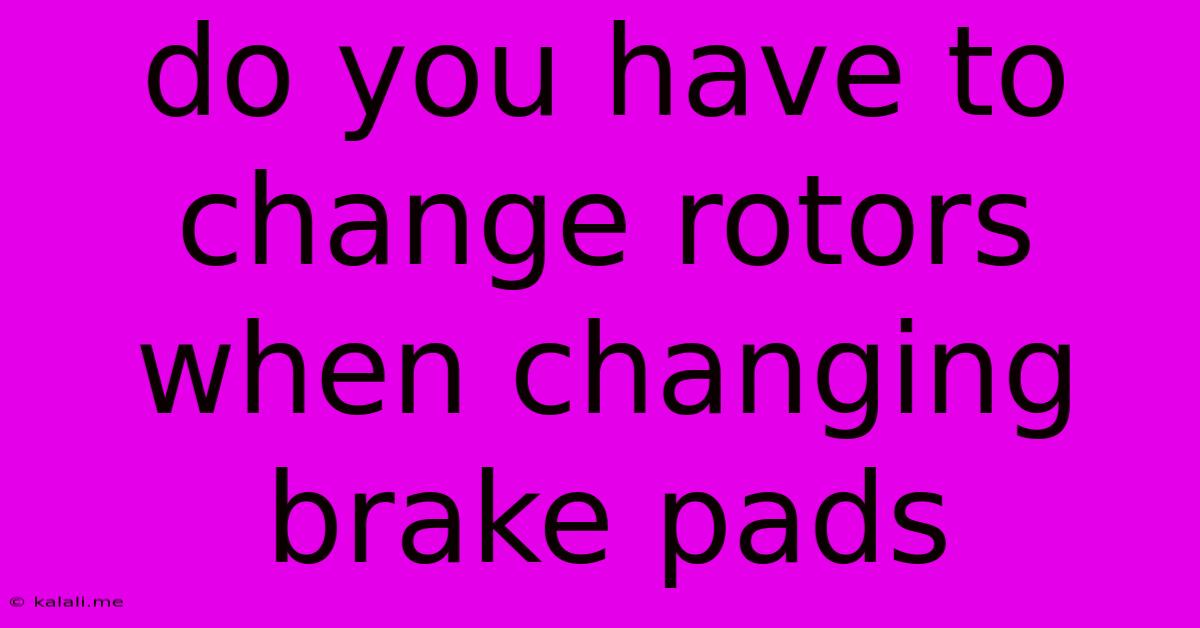Do You Have To Change Rotors When Changing Brake Pads
Kalali
Jun 01, 2025 · 3 min read

Table of Contents
Do You Have to Change Rotors When Changing Brake Pads?
Meta Description: This article explores the crucial question of whether rotor replacement is necessary when changing brake pads. We'll delve into factors influencing this decision, helping you determine the best course of action for your vehicle's braking system.
Replacing your brake pads is a relatively straightforward maintenance task, but the question of whether you also need to change your rotors often arises. The short answer is: not necessarily. While brake pads wear down regularly, rotors have a longer lifespan and may not require replacement every time you change your pads. However, several factors influence this decision. Let’s dive deeper.
Understanding Brake Pad and Rotor Wear
Before we get into when rotor replacement is necessary, it's crucial to understand how brake pads and rotors work together. When you brake, the brake pads clamp down on the rotors, creating friction that slows your vehicle. This friction causes wear and tear on both components. Brake pads are designed to wear down, requiring more frequent replacement. Rotors, on the other hand, are more durable but will eventually wear out, requiring replacement.
Factors Determining Rotor Replacement
Several factors determine whether your rotors need replacing when changing your brake pads:
-
Rotor Thickness: Rotors have a minimum thickness specified by the manufacturer. If your rotors have worn down to or below this minimum thickness, they must be replaced. You can usually find this minimum thickness listed in your owner's manual or by searching online for your specific vehicle's specifications. Using a caliper to measure the rotor thickness will give you the precise information.
-
Rotor Scoring or Grooving: Deep grooves or scoring on the rotor surface indicates significant wear and tear. This uneven surface can lead to inconsistent braking performance, vibration, and noise. Severe scoring usually necessitates rotor replacement. Minor surface imperfections might be acceptable, but a professional inspection is always recommended.
-
Warping or Distortion: Overheating or excessive wear can cause rotors to warp, leading to pulsations in the brake pedal and potentially dangerous braking issues. Warped rotors should be replaced for safety and optimal braking performance. A visual inspection might reveal warping, but a mechanic can perform a more detailed assessment.
-
Brake Pad Wear: While not directly correlated to rotor replacement, extremely worn brake pads can accelerate rotor wear. Neglecting brake pad replacement can lead to increased damage to the rotors and necessitate replacement sooner than expected.
-
Vehicle Age and Mileage: Older vehicles with high mileage are more likely to require rotor replacement alongside brake pad changes. The cumulative wear and tear over time often necessitates replacement of both components.
When to Replace Rotors
As a general rule of thumb, you should consider replacing rotors when:
- The rotors are below the minimum thickness specified by the manufacturer.
- The rotors show significant scoring, grooving, warping, or distortion.
- You notice pulsations in the brake pedal during braking.
- Your mechanic recommends it after a thorough inspection.
When Rotor Resurfacing Might Be an Option
In some cases, instead of outright replacing rotors, a process called rotor resurfacing or lathe turning might be an option. This involves machining a thin layer off the rotor surface to remove scoring and imperfections, restoring its flatness. However, resurfacing reduces the rotor's thickness, so it's not always feasible, especially if the rotors are already close to the minimum thickness. Furthermore, this process may not be economical for all vehicle types.
Conclusion
Ultimately, the decision of whether to replace rotors when changing brake pads depends on their condition. While not always necessary, a thorough inspection is crucial to ensure braking safety and optimal performance. Consulting a qualified mechanic is always recommended to accurately assess the condition of your rotors and make an informed decision. Remember, prioritizing safety should always be the top concern when dealing with your vehicle's braking system.
Latest Posts
Latest Posts
-
3 Wire Led String Light Wiring Diagram
Jun 02, 2025
-
Does Helldivers 2 Scale With Players
Jun 02, 2025
-
Why Put A Marble In Peanut Butter
Jun 02, 2025
-
Rock Band 4 Xbox One Songs
Jun 02, 2025
-
Can You Put A Window A C In The Wall
Jun 02, 2025
Related Post
Thank you for visiting our website which covers about Do You Have To Change Rotors When Changing Brake Pads . We hope the information provided has been useful to you. Feel free to contact us if you have any questions or need further assistance. See you next time and don't miss to bookmark.